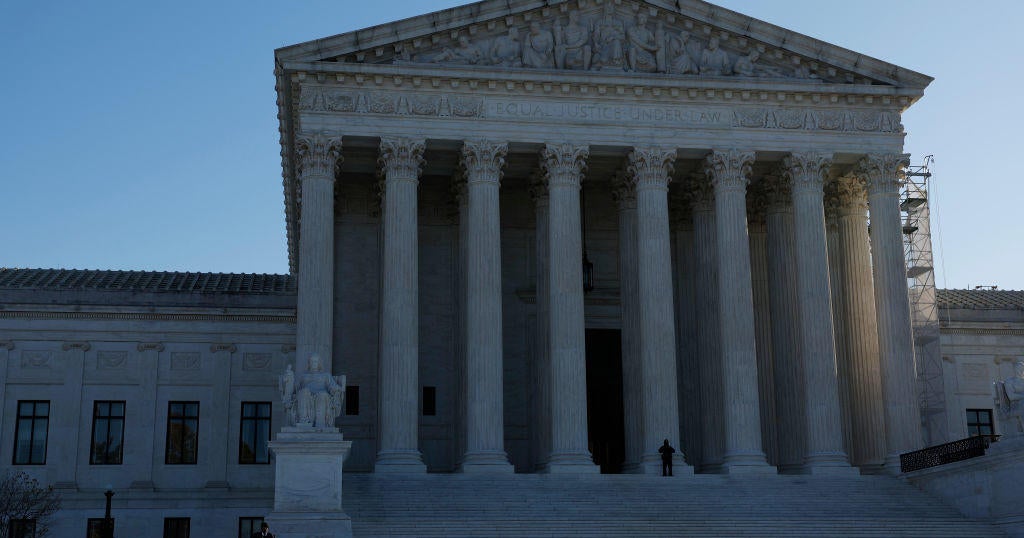CBS News
Judge unseals evidence in Trump federal election interference case

Watch CBS News
Be the first to know
Get browser notifications for breaking news, live events, and exclusive reporting.
CBS News
Prominent pro-Putin ballet star Sergei Polunin says he’s leaving Russia

Moscow — Former Royal Ballet star Sergei Polunin, famous for his tattoos of Russian President Vladimir Putin, on Wednesday announced that he plans to leave Russia. The Ukrainian-Russian dancer was one of the most prominent stars who backed Russia’s unilateral 2014 annexation of Crimea and its military assault on Ukraine. He was rewarded with prestigious state posts.
In a rambling, misspelled message on his Instagram account, Polunin wrote: “My time in Russia ran out a long time ago, it seems at this moment that I have fulfilled my mission here.”
The post first appeared Sunday on his little-read Telegram account.
Ian Gavan/Getty
Polunin, 35, did not give a specific reason for leaving but said that “a time comes when the soul feels it is not where it should be.”
He said he was leaving with his family — his wife Yelena and three children — but “where we will go is not clear so far.”
In the summer, the dancer complained of a lack of security and said he was being followed.
Polunin, who was born in Ukraine, backed Putin’s 2014 annexation of Crimea — a prelude to the ongoing, full-scale invasion of Ukraine that Putin launched in February 2022.
The dancer was granted Russian citizenship in 2019. He was appointed acting head of a dance academy in occupied Crimea’s biggest city, Sevastopol, and director of the city’s opera and ballet theatre, for which a large new building is under construction.
Just last year he was decorated by Putin for his role in popularizing dance. But in August he was replaced as head of the dance academy by former Bolshoi prima Maria Alexandrova, and a week ago, Russia’s arts minister Olga Lyubimova announced his theater director job would go to singer Ildar Abdrazakov.
This came after on December 9 Polunin published a social media post saying he was “very sorry for people” living in the heavily bombarded village near Ukraine’s city of Kherson, where his family originates from, and that “the worst deal would be better than war.”
Ian Gavan/Getty
Aged 13, Polunin won a scholarship to train at the Royal Ballet School in London and became its youngest ever principal dancer.
With his tattoos — including a large depiction of Putin’s face emblazoned prominently on his chest — and his rebellious attitude, he became known as the “bad boy of ballet” and caused a sensation by resigning from the Royal Ballet at the height of his fame in 2012.
Later he made a 2015 hit video to Irish musician Hozier’s song “Take Me to Church” and was the star of a 2016 documentary called “Dancer.”
He moved to perform at Moscow’s Stanislavsky Musical Theatre’s ballet before launching a solo career, starring in dance performances in roles including the mystic Grigory Rasputin.
In 2019 he posed for AFP with a large tattoo of Putin on his chest which he later supplemented with two Putin faces on either shoulder. He also has a large Ukrainian trident on his right hand.
This year he took part in Putin’s campaign for reelection as a celebrity backer.
CBS News
Supreme Court takes up South Carolina’s effort to defund Planned Parenthood

Washington — The Supreme Court on Wednesday agreed to consider South Carolina health department’s effort to cut off funding from Planned Parenthood because it performs abortions, wading into another dispute over access to the procedure in the wake of its reversal of Roe v. Wade.
The case, known as Kerr v. Edwards, stems from the state’s decision in 2018 to end Planned Parenthood South Atlantic’s participation in its Medicaid program. Gov. Henry McMaster, a Republican, directed the South Carolina Department of Health and Human Services to deem abortion clinics unqualified to provide family planning services and end their Medicaid agreements.
Planned Parenthood operates two facilities in the state, one in Charleston and the other in Columbia, and provides hundreds of Medicaid patients with services like physicals, cancer and other health screenings, pregnancy testing and contraception. Federal law prohibits Medicaid from paying for abortions except in cases of rape or incest, or to save the life of the mother.
Planned Parenthood and one of its patients, Julie Edwards, sued the state, arguing that cutting off its funding violated a provision of the Medicaid Act that gives beneficiaries the right to choose their provider.
A federal district court blocked South Carolina from ending Planned Parenthood’s participation in its Medicaid program, and a U.S. appeals court upheld that decision, finding that Edwards could sue the state to enforce the Medicaid Act’s free-choice-of-provider requirement.
The legal battle has already been before the Supreme Court in the past, with the high court last year ordering additional proceedings after deciding in a separate case that nursing home residents could sue their state-owned health care facility over alleged violations of civil rights.
After reconsidering its earlier decision, the three-judge appeals court panel ruled unanimously in March that Edwards’ lawsuit against the state could go forward and said South Carolina couldn’t strip Planned Parenthood of state Medicaid funds.
“This case is, and always has been, about whether Congress conferred an individually enforceable right for Medicaid beneficiaries to freely choose their healthcare provider. Preserving access to Planned Parenthood and other providers means preserving an affordable choice and quality care for an untold number of mothers and infants in South Carolina,” Judge Harvie Wilkinson wrote for the 4th Circuit panel.
South Carolina officials asked the Supreme Court to review that decision, marking the third time the case has been before the justices. The justices agreed to take up the question of whether “the Medicaid Act’s any-qualified provider provision unambiguously confers a private right upon a Medicaid beneficiary to choose a specific provider.”
South Carolina is among the more than two dozen that have passed laws restricting access to abortion in the wake of the Supreme Court’s June 2022 decision reversing Roe v. Wade. In South Carolina, abortion is outlawed after six weeks of pregnancy with some exceptions.
Several states have also enacted laws blocking Planned Parenthood from receiving Medicaid funding, including Arkansas, Missouri, Mississippi and Texas.
CBS News
Lithium battery fires on U.S. flights now occur nearly twice a week, according to new FAA data

As millions prepare to fly for the holidays, the Federal Aviation Administration is warning travelers about a hidden danger in their luggage: lithium-ion batteries. Found in everyday devices like laptops, tablets and even electric toothbrushes, these batteries can catch fire if they overheat or are damaged.
Last July, panic erupted on an American Airlines flight from San Francisco to Miami after a laptop battery in a carry-on bag ignited.
“It was absolute chaos. It truly felt like every man for themselves. And it was terrifying,” said Shilpa Patel, a passenger on the flight. “I don’t know if we’re going to explode. All I know is I need to get out and I need to survive.”
FAA data shows that lithium battery fires on U.S. flights have risen 388% since 2015, now occurring nearly twice a week.
“Any fire at 30,000 feet is unacceptable,” said David Wroth of UL Standards & Engagement, a safety research organization.
A survey of more than 800 flight attendants conducted by UL found that 87% are concerned about lithium battery risks on airplanes, and more than a third believe airlines should do more to ensure passenger safety. While the FAA requires airlines to include general safety information in preflight announcements, those warnings often don’t address the specific risk of battery fires.
“It’s a balance we probably need to do a better job striking with the airlines,” said Ben Supko, who oversees hazardous materials safety for the FAA. “Passengers don’t fully understand how serious the risk is.”
Supko said passengers need to monitor devices during a flight and immediately notifying the crew if a device becomes warm, discolors, or bulges. Passengers are also warned not to pack lithium batteries in checked luggage, as fires in the cargo hold are harder to extinguish.
“When you don’t know what’s going to happen, you act erratically,” said Patel. “It costs us nothing just to say, ‘Hey, the reason why we’re so serious about this is because it could be really dangerous. It could catch fire.'”
The UL survey also found that one in four passengers admits to packing lithium batteries in their checked bags. It is a dangerous practice for one reason in particular: It would be even harder to put out a fire in the plane’s cargo hold.
CBS News reached out to American Airlines regarding the incident at the San Francisco airport and potential updates to its safety announcements. The airline did not address the question directly but stated that its flight attendants receive thorough and ongoing training to handle emergencies onboard.










